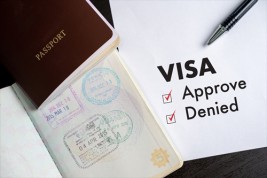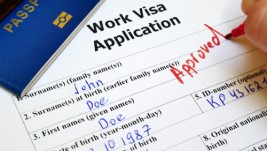What happens if your visa in Japan expires?
If the visa of a foreigner living in Japan expires, ignoring or fleeing from a notice from the police or immigration bureau will result in severe punishment such as arrest or deportation. For this reason, it is important to renew your visa before it expires. However, even if your visa expires, there is a possibility that you can re-obtain it if you apply for re-issuance immediately. In this article, we will explain not only what happens if your visa expires in Japan, but also how to re-obtain it after it has expired.If you are looking for a job in Japan and would like to receive generous visa support, please use “G Talent”, a job change agency for foreign engineers.What happens if you stay in Japan after your visa / residence status has expired?If you stay in Japan after your visa (residence status) has expired, you will be considered to be an illegal overstayer. Illegal overstaying is a serious criminal offense, so if you cannot return to your home country before your visa expires, you will need to go through the renewal process.However, permanent residents do not have a fixed period of stay, so even if their period of stay expires, they will not be considered to be overstaying. However, permanent residents are also required to renew their residence cards, so be sure to do so before the deadline. If you forget to renew your card, you may be imprisoned for up to one year or fined up to 200,000 yen, so please be careful.Reference: 永住者で在留カードの期限が近い方へ/東京ビザ申請サポート[Caution] If you overstay your visa by even one day, you will be treated as an illegal overstayerIn Japan, if the period of stay on your visa expires even by one day, you will be considered to be staying in the country illegally and will be punished. Some people think that it will be okay to stay for a few days, but the Immigration Bureau and the police in Japan are constantly investigating the whereabouts of illegal residents, so remember that if you overstay your visa, you will definitely be caught and arrested.However, if you turn yourself in to the Immigration Bureau within two months of your visa expiring, there is a high chance that they will grant you permission to apply for a new visa.Reference: オーバーステイ・不法滞在についてよくある質問です/外国人在留資格ビザセンターPenalties for being arrested for overstaying or illegal stayIf it is discovered through an investigation by the police or immigration officials that you have overstayed in Japan with an expired visa, you will be arrested by the police and the following penalties will be imposed.<Penalties for being arrested for overstaying or illegal stay>DeportationImprisonment for up to 3 years or a fine of up to 3 million yenAlso, if you continue to work in Japan while your visa has expired, the following penalties will also be imposed on the employer who employs the foreign national in question, so please be careful.<Penalties for employers of foreign nationals who are overstaying their visas>Imprisonment for up to 3 years or a fine of up to 3 million yen If you are arrested, during the 10 to 20 day long detention period, you will be investigated in detail about when you came to Japan, your purpose for coming, where you worked while your visa was expired, where you lived, etc. After that, in many cases, you will be given a severe punishment called “deportation”, and after being detained at the Immigration Bureau, you will be deported to your country of residence. If you are deported, you will not be able to re-enter Japan for 5 years (10 years if it is your second deportation).Reference: ビザ(在留資格)の期限が切れていたときの対処方法/みなとまち行政書士事務所<Supplementary information> Cases where your visa has expired while you are overseasIf your Japanese visa expires while you are overseas, there is a high chance that you will be able to re-enter Japan with a re-entry permit if you do so within two months of the expiration date of your visa. You cannot apply to extend your period of stay at a Japanese embassy overseas, so if you realize that your visa has expired while you are overseas, you should return to Japan as soon as possible and apply for an extension at the Regional Immigration Bureau that has jurisdiction over your place of residence.However, if more than two months have passed since the expiration date of your visa, you will need to go through the process of applying for a Certificate of Eligibility for Residence Status and re-obtain your visa before you can re-enter Japan. The application process for a Certificate of Eligibility for Residence Status takes longer than a regular visa renewal, and you will need to submit a number of documents.<Documents required for applying for a Certificate of Eligibility for Residence Status (in the case of an intra-company transfer from Japan to overseas)>Application for Certificate of Eligibility (1 copy)1 passport-sized photo1 stamped self-addressed envelope (404 yen)Documents proving that you are enrolled at your “affiliated organization”In order to avoid complicated procedures, foreign nationals who are going overseas while staying in Japan should make sure they know the expiry date of their Japanese visa.Reference: If the period of stay has expired, can I re-acquire a visa? / Tsukuba World Administrative Scrivener's OfficeFlow of re-acquiring a work visaThere are 19 types of work visas in Japan, and the validity period for each is as follows.Type of work visaPersons eligible for visa acquisitionExpiration dateDiplomatic visaAmbassadors, ministers, consuls-general, members of delegations, etc. from foreign governments, and their family membersPeriod of time during which diplomatic activities are carried outOfficial visaEmployees of foreign government embassies and consulates, people dispatched on official business from international organizations, etc., and their family members5 years, 3 years, 1 year, 3 months, 30 days or 15 daysProfessor visaUniversity professors, associate professors, lecturers, assistants, etc.5 years, 3 years, 1 year, 3 months or 4 months (only for business management)Art visaComposers, lyricists, painters, sculptors, craftspeople, photographers, etc.Religious visaReligious workers such as priests, bishops, and missionariesPress visaNewspaper reporters, magazine reporters, editors, news photographers, announcers, etc.Business management visaCompany owners, managers, etc.Legal and accounting services visaAdministrative scriveners, lawyers, judicial scriveners, certified public accountants, tax accountants, labor and social security attorneys, etc.Medical visaDoctors, dentists, pharmacists, nurses, assistant nurses, public health nurses, midwives, dental hygienists, radiological technologists, physical therapists, occupational therapists, orthoptists, clinical engineers, physical therapists, prosthetists, etc.Research visaResearchers working for government agencies or companiesEducation visaLanguage instructors at elementary schools, junior high schools, high schools, etc.Nursing care visaCaregivers with qualifications as a certified care worker, etc.Engineer/Specialist in Humanities/International Services VisaEmployees temporarily transferred from a foreign parent company, subsidiary, grandchild company, or affiliate companyIntra-Company Transfer Visa外国の親会社や子会社、孫会社、関連会社にあたる事業所から一時的に派遣される転勤者5 years, 3 years, 1 year, 3 monthsTechnical VisaForeign chefs, precious metal craftsmen, pilots, architects/civil engineers with unique overseas skills, repair technicians for overseas products, animal trainers, sports instructors, sommeliers, etc.Entertainment VisaSingers, dancers, actors, fashion models, professional athletes, circus animal trainers, sports trainers, choreographers, directors, etc. 3 years, 1 year, 6 months, 3 months, 15 daysSpecified Skills Visa[Specified Skills 1]People who want to obtain work qualifications in 14 specific fields, such as nursing care, building cleaning, the materials industry, industrial machinery manufacturing, and electrical/electronic information-related industries[Specified Skills 2]People who are engaged in work that requires skilled labor in the construction and shipbuilding/marine engineering fields[Specified Skills 1]1 year, 6 months, 4 months[Specified Skills 2]3 years, 1 year, 6 monthsTechnical Intern Training VisaTechnical interns accepted from overseas subsidiaries, etc., or technical interns accepted through a management organization, etc.1 year, 6 monthsYou can check the validity period of your visa by looking at the seal on your passport or your resident card, so if you forget, check these documents. If you are unable to renew your visa within the validity period set when you obtained your work visa, please follow the flow below to re-apply for your visa.Reference: 就労や長期滞在を目的とする場合/外務省Flow for re-applying for a work visaThe flow for applying for a work visa is as follows.Contact the Immigration Bureau promptlyReport to the Immigration BureauContact the Immigration Bureau promptlyIf you realize that your visa has expired, you should promptly contact the Immigration Bureau that has jurisdiction over your place of residence. You can find the contact details for the Immigration Bureau by accessing the Immigration Bureau website and checking the details for your place of residence.When you contact the Immigration Bureau, explain that you have just realized that your visa has expired, and ask for instructions on what documents you need to submit and what you should do next. If you intend to work in Japan, be sure to tell the staff that you have no intention of leaving the country and that you want to continue working in Japan.If you do not tell them, they will think that you are there to appear for an “exit order”, which allows overstaying foreigners to return to their home country without being detained. If you are thought to be there for an exit order, you will be taken through the exit procedures and will not be able to enter Japan for the next year, so be careful.Reference: ビザの更新,期限が切れたら?!更新の申請の特例/弁護士法人あいち刑事事件総合法律事務所Report to the Immigration BureauWhen the relevant date and time comes, you must report to the Immigration Bureau that has jurisdiction over your place of residence. If possible, it is a good idea to have a Japanese colleague or spouse accompany you. When you report to the Immigration Bureau, you must submit the following documents. In addition to the documents you have on hand, there are also documents that need to be issued by the city office, so be sure to prepare them in advance.PassportCertificate of employmentExpired residence cardStatement of reasons for application (a written explanation of the reasons for forgetting to renew your visa, the circumstances, and your reflections)Most recent certificate of residence tax issued by the city officeMost recent certificate of residence tax payment issued by the city officeReference: 在特出頭の“必要書類”は?/外国人助太刀倶楽部[Supplementary information] There are cases where you cannot re-acquire a visaEven if you submit the necessary documents, there are cases where you may not be able to re-acquire a work visa if any of the following applyIf the work you are currently doing is outside the scope of your visa statusIf you have changed the content of your visa status without permissionIf you are working outside the scope of your visa statusIf you have a bad reputation (e.g. you have been punished by the police or you are involved in illegal employment)For smoothly re-acquiring a work visa, you should follow the rules of Japan so that you do not fall into any of the above categories.Reference: 就労ビザの更新で不許可になるケースと対処方法/TOMAコンサルタンツグループWhat you must not do when your visa in Japan expiresIf your visa expires in Japan, you must not do the following.Flee from the police or immigration officersFlee to the other countryNeglect to do anything about it even though you know your visa has expiredIf you flee or neglect to do anything about it even though you know your visa has expired, you will be subject to severe penalties such as deportation or arrest. If you notice that your visa has expired, you should follow the necessary procedures as outlined in the “Flow of Re-acquiring a Working Visa” section, as there is a possibility that your visa will be reissued if you contact the Immigration Bureau promptly.Reference: 違反行為 絶対にやってはいけない 10のポイント/立命館アジア太平洋大学Make sure you know the period of your visa in Japan and take care not to let it expireIf you are a foreigner coming to Japan to work, you will need to obtain the most suitable visa from the 19 types of work visas available, depending on the nature of your work. However, the period of stay for each type of work visa differs, so it is important to know how many years you can stay in Japan.If your visa expires before you can renew it, you can still get a new one if you contact your local immigration office as soon as possible. If you run away or leave it unattended, you will be subject to severe penalties such as arrest or deportation, so please be careful not to let it expire.If you are looking for work in Japan, we recommend using "G Talent", which also provides visa acquisition support. Career advisors who are familiar with working in Japan provide support, and visa-related consultations are also accepted.











